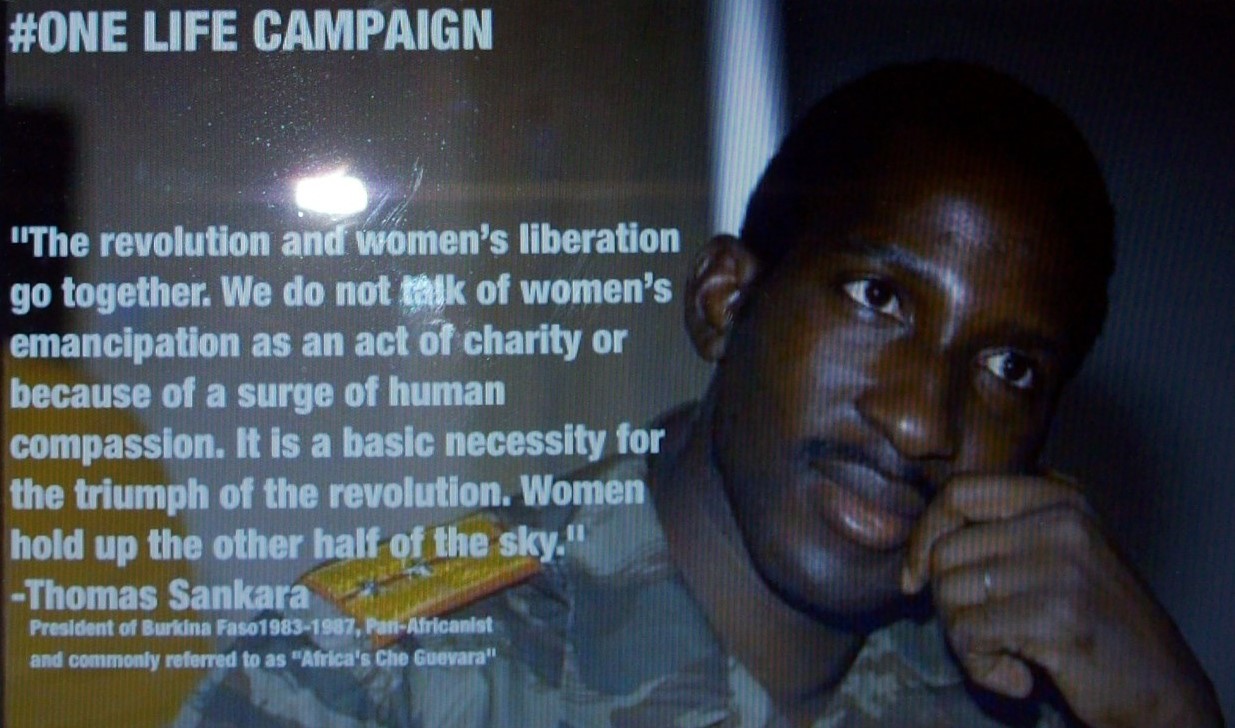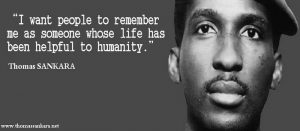
I am honored to dedicate the APJ’s first blog post to a visionary who gallantly opted to sit on the right side of world history at the cost of his life: President Thomas Sankara of Burkina Faso. This African hero was killed, dismembered and buried in an unmarked grave on October 15, 1987 during a coup which brought to power the person whom he had considered a friend: Blaise Compaoré… After twenty-seven years of dictatorship, the latter stepped down earlier today, thereby yielding to a popular revolution.
The area referred to today as Burkina Faso was formerly known as the Republic of Upper Volta. But, on August 4, 1984, then-President Thomas Sankara renamed it “Burkina Faso” to convey his vision for his people. The words “Burkina” and “Faso” mean “upright people” and “fatherland/motherland” in Mòoré and Dioula respectively, the two major languages of the country. Hence, Burkina Faso may be rendered in English as “The Land of Upright People”.
Never in the post-Sankara era has this nation so much warranted its appellation as it does today. But, how did Burkina Faso get there? Well, as now former President Blaise Compaoré hoped to bypass Article 37 of his country’s Constitution barring him from seeking yet another term in office ahead of the 2015 presidential elections, Members of Parliament from his party were to hold a session yesterday to amend the term limitations. But the Upright People swarmed the streets of Ouagadougou, the capital city, to oppose the move, and then marched to the presidential palace to oust the dictator. When it became clear that their determination was unwavering, the President’s younger brother tried to flee the country but was arrested at the airport.
Today, after the resignation of Blaise Compaoré, the army chief, General Honoré Traoré, has taken over and the whole African continent is looking on him. Will he emulate the model roles played by Ghana’s Jerry Rawlings and Niger’s Salou Djibo? History is reaching out to both him and the Burkinabé people as they must now live up to the vision of Thomas Sankara. But who exactly is the latter?
A Communist to his detractors, but a visionary even to the harshest of them, Thomas Sankara belongs to this select breed of noble leaders that humanity begrudgingly welcomes every 50-100 years. Far ahead of his time, he genuinely championed women’s empowerment. While today low-ranking ministerial positions are earmarked for women in several developed countries, 27 years ago Thomas Sankara appointed women to top spots in the government (ministries of Budget, Finance, etc.), territorial command (seven heads of administrative territorial divisions were women, among whom the official administering the capital city) and army (the prestigious Presidential Guard was composed of several women).
Furthermore, at a time when he and his African counterparts were considered mere subordinates helping France rule its vassal territorial extensions, then French president François Mitterrand visited Burkina Faso in 1986. Thomas Sankara organized a warm and popular welcome for his host and then, taking the floor in front of TV cameras, made one of his numerous brave and insightful speeches: “Killers, such as Pieter Botha [then-president of South Africa under apartheid whom François Mitterrand had recently welcomed in France], got the right to tour France, so beautiful and so clean – They stained it. They stained it with their hands and feet covered with blood. And all those who have enabled them to make these deeds will be fully accountable thereof…”
Three years earlier in Paris, a French journalist asked him during a press conference what he “had gone to look for” during his recent visits to Moscow and Cuba. Thomas Sankara responded by pointing out that he had also visited several other countries (in order to stress his non-alignment amid the cold war); then, recalling that Moscow was geographically further away from Burkina Faso than France, he said that a closer country (France) could have spared him the long trip if they had offered the assistance he needed.
Thomas Sankara is an African hero whose legendary life cannot be told in a humble blog post. I invite you to learn about him and from him by watching this documentary if you understand French, or its English version.
![Burkinabé people swarm the streets of Ouagadougou. [Source: http://www.upc.bf]](https://studentreview.hks.harvard.edu/wp-content/uploads/Ouagadougou-300x225.jpg)
